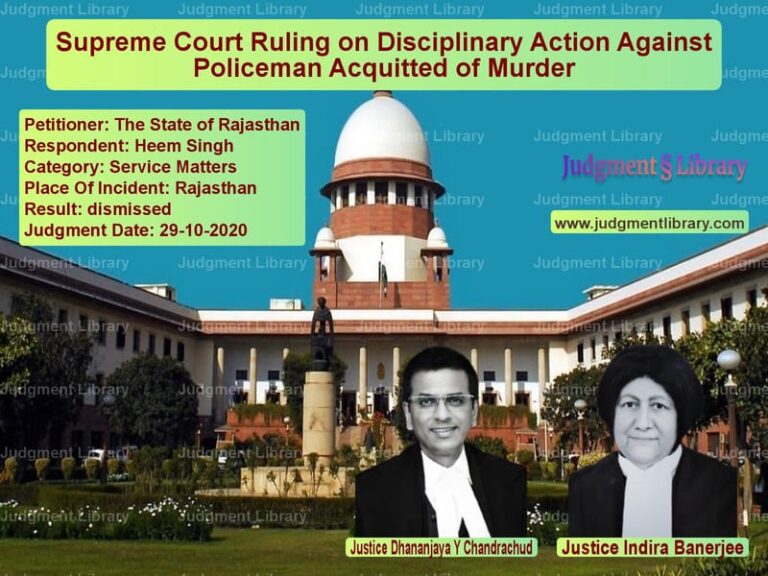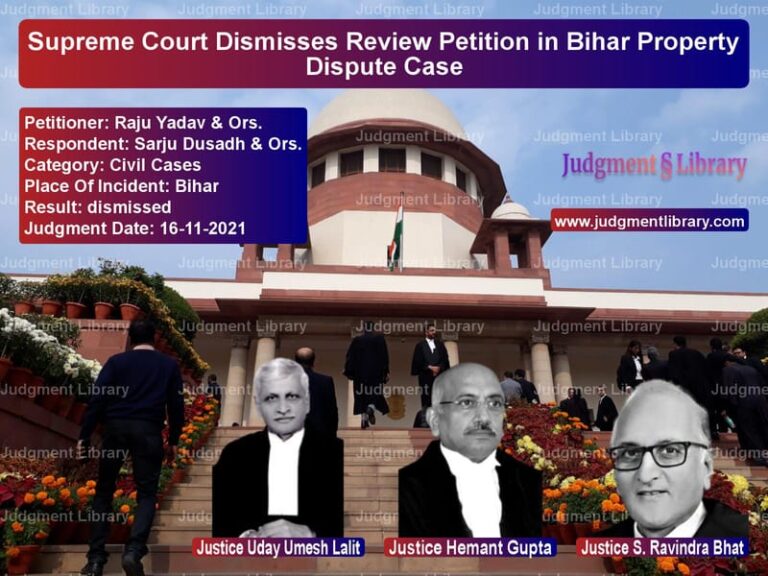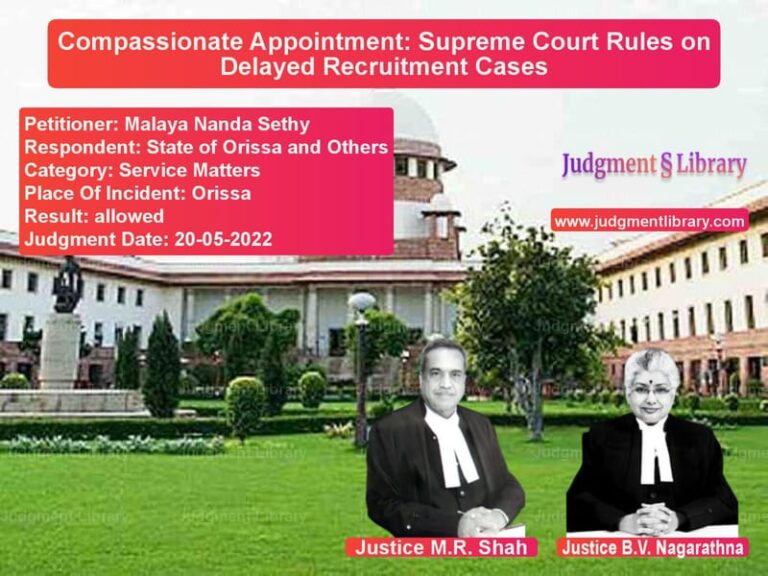Vedanta Limited vs. The State of Tamil Nadu & Ors – Supreme Court Upholds Environmental Protection Measures
The case of Vedanta Limited vs. The State of Tamil Nadu & Ors is a landmark environmental law case concerning the closure of the copper smelter plant operated by Vedanta Limited in Thoothukudi, Tamil Nadu. The Supreme Court of India reviewed the decision of the High Court, which had upheld the closure of the plant due to environmental violations. This case underscores the principles of sustainable development, the polluter-pays doctrine, and the enforcement of environmental laws against large industrial entities.
Background of the Case
The controversy surrounding Vedanta Limited’s copper smelter plant dates back to 1996 when the company set up its facility in Thoothukudi, Tamil Nadu. Over the years, residents and environmental activists raised concerns about air and water pollution caused by the plant’s operations. The Tamil Nadu Pollution Control Board (TNPCB) and the State Government issued multiple warnings and directives to Vedanta to comply with environmental norms.
The issue intensified in 2013 when the Supreme Court imposed a fine of Rs. 100 crores on Vedanta for violating environmental regulations but allowed the plant to continue operating with strict compliance measures. However, complaints of pollution persisted, leading to protests and legal action against the company. In April 2018, a massive protest against the expansion of the plant resulted in police firing, which killed 13 people. Subsequently, the TNPCB and the Tamil Nadu Government ordered the closure of the plant in May 2018.
Key Legal Issues Considered
- Whether the Tamil Nadu Government and TNPCB were justified in ordering the closure of Vedanta’s plant.
- Whether Vedanta had repeatedly violated environmental laws and caused significant ecological damage.
- Whether the High Court was correct in upholding the closure order despite Vedanta’s claims of compliance with regulations.
- The applicability of the principles of sustainable development and the polluter-pays doctrine in the case.
- The role of public interest and environmental justice in determining the legitimacy of industrial operations.
Arguments by the Petitioner (Vedanta Limited)
- Vedanta argued that its plant was operating with all necessary environmental clearances and that the closure order was arbitrary and politically motivated.
- The company claimed that TNPCB had not conducted proper scientific assessments before ordering the shutdown.
- Vedanta highlighted that its plant provided significant economic benefits, including employment to thousands of workers.
- The petitioner contended that shutting down the plant affected India’s copper production and led to increased dependence on imports.
- Vedanta asserted that environmental concerns were exaggerated and that the pollution levels were within permissible limits.
Arguments by the Respondents (Tamil Nadu Government & TNPCB)
- The State Government argued that Vedanta had repeatedly violated environmental regulations, causing significant damage to the local ecosystem.
- It was contended that the closure was necessary to protect the health and well-being of local residents.
- TNPCB presented evidence of excessive air and water pollution caused by the smelter plant.
- The government pointed to the violent protests and public outrage as a sign of widespread concern over the plant’s operations.
- The respondents asserted that Vedanta had failed to adopt sustainable practices despite multiple opportunities to rectify its shortcomings.
Supreme Court’s Observations
1. Environmental Compliance and Past Violations
The Court examined Vedanta’s history of environmental violations and found that the company had failed to comply with several directives issued by TNPCB. The judgment stated:
“Environmental laws exist to ensure that industrial activities do not harm public health and the ecosystem. Repeated non-compliance cannot be condoned.”
2. The Role of Public Interest
The Supreme Court emphasized the need to balance economic development with environmental sustainability. It noted:
“Industrial progress cannot come at the cost of environmental degradation. The concerns of local communities must be given due consideration.”
3. Sustainable Development and the Polluter-Pays Principle
The judgment reinforced the application of the sustainable development principle, which requires industries to adopt environmentally friendly practices. The Court ruled:
“Companies operating in environmentally sensitive zones must uphold the highest standards of compliance. Those who fail to do so must bear the consequences.”
4. Justification for Closure
The Supreme Court found that the High Court was correct in upholding the closure order, given the gravity of the violations. The judgment clarified:
“The closure of the plant was a necessary regulatory action and not an arbitrary exercise of power.”
Final Judgment
- The Supreme Court upheld the Tamil Nadu Government’s decision to close Vedanta’s plant.
- Vedanta’s appeal was dismissed, and the company was directed to comply with all environmental obligations before seeking any reconsideration.
- The Court reaffirmed the state’s responsibility to protect public health and the environment.
Legal and Social Implications
1. Strengthening Environmental Regulations
This ruling reinforces the need for strict enforcement of environmental laws against industries that fail to comply with regulations.
2. Corporate Accountability
The judgment highlights that large corporations cannot evade responsibility for environmental harm by citing economic benefits.
3. Protection of Local Communities
The decision affirms the rights of local residents to live in a pollution-free environment, emphasizing the importance of environmental justice.
4. Setting a Precedent for Industrial Regulation
This ruling serves as a benchmark for similar cases involving industrial pollution and environmental non-compliance.
Conclusion
The Supreme Court’s ruling in the Vedanta Limited vs. The State of Tamil Nadu case marks a significant moment in India’s environmental jurisprudence. By prioritizing public health and ecological integrity, the Court has sent a strong message that industrial violations will not be tolerated. This judgment upholds the principle that sustainable development is the cornerstone of economic progress and reaffirms the legal framework protecting India’s environmental interests.
Petitioner Name: Vedanta Limited.Respondent Name: The State of Tamil Nadu & Others.Judgment By: Justice Dhananjaya Y Chandrachud, Justice J B Pardiwala, Justice Manoj Misra.Place Of Incident: Thoothukudi, Tamil Nadu.Judgment Date: 29-02-2024.
Don’t miss out on the full details! Download the complete judgment in PDF format below and gain valuable insights instantly!
Download Judgment: vedanta-limited-vs-the-state-of-tamil-n-supreme-court-of-india-judgment-dated-29-02-2024.pdf
Directly Download Judgment: Directly download this Judgment
See all petitions in Environmental Cases
See all petitions in Judgment by Dhananjaya Y Chandrachud
See all petitions in Judgment by J.B. Pardiwala
See all petitions in Judgment by Manoj Misra
See all petitions in dismissed
See all petitions in supreme court of India judgments February 2024
See all petitions in 2024 judgments
See all posts in Environmental Cases Category
See all allowed petitions in Environmental Cases Category
See all Dismissed petitions in Environmental Cases Category
See all partially allowed petitions in Environmental Cases Category







